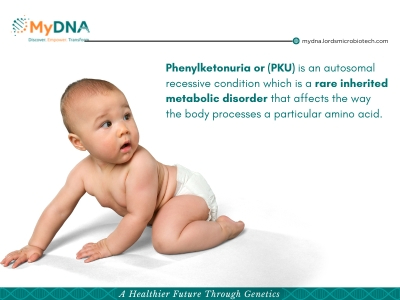
PKU is an inherited metabolic disorder affects approximately 1 in every 10,000 to 15,000 newborns worldwide. It is characterised by the body's inability to properly metabolise the amino acid phenylalanine. Normally, an enzyme called phenylalanine hydroxylase (PAH) converts phenylalanine into another amino acid, tyrosine. The high levels of Phenylalanine present in PKU competitively inhibits the hydroxylation of tyrosine by tyrosinase which is the first step in the formation of the pigment melanin. However, individuals with PKU lack this enzyme or have a defective version, leading to a buildup of phenylalanine in the blood and brain. Virtually all untreated patients have IQ below 50. Despite its rarity, PKU can have significant and lifelong consequences if left untreated.
Causes of PKU:
PKU is caused by mutations in the gene responsible for producing the PAH enzyme. This gene is inherited in an autosomal recessive pattern, meaning that a child must inherit two mutated copies of the gene (one from each parent) to develop the disorder. If both parents are carriers of the mutated gene, there's a 25% chance with each pregnancy that their child will have PKU.
Symptoms of PKU:
Symptoms of PKU typically appear within the first few months of life, after the baby begins to consume phenylalanine-containing foods, such as breast milk or formula. These symptoms may include:
- Developmental delays.
- Intellectual disability.
- Behavioural problems.
- Seizures.
- Skin rashes (eczema).
- Lighter skin, hair, and eyes compared to family members.
- Musty odour in the breath, skin, and urine due to the buildup of phenylalanine byproducts.
Maternal PKU :
When women with PKU who are not on a low phenylalanine diet become pregnant, the offspring are affected with maternal PKU syndrome. Congenital cardiac abnormalities, mental retardation, and microcephaly are caused by high blood levels in the mother. Thus, phenylalanine needs to be controlled with diet starting before conception.
Diagnosis of PKU:
PKU is usually detected through newborn screening tests, which are performed shortly after birth. These tests involve collecting a small blood sample from the baby's heel and analysing it for elevated levels of phenylalanine. If PKU is suspected based on the screening results, further diagnostic tests, such as genetic testing or blood phenylalanine levels, may be conducted to confirm the diagnosis.
Treatment and Management:
Early diagnosis and treatment are crucial in managing PKU and preventing complications. The primary goal of treatment is to maintain blood phenylalanine levels within a safe range to prevent brain damage and cognitive impairment. Treatment options for PKU include:
- Dietary restrictions: The cornerstone of PKU management involves following a strict low-phenylalanine diet. This typically means avoiding high-protein foods, such as meat, dairy, eggs, nuts, and certain grains, and consuming specially formulated medical foods and formulas that are low in phenylalanine.
- Supplementary therapy: In addition to dietary restrictions, individuals with PKU may require supplementation with specific amino acids, vitamins, and minerals to ensure proper nutrition.
- Monitoring: Regular monitoring of blood phenylalanine levels is essential to adjust dietary therapy and ensure that phenylalanine levels remain within the target range.
- Lifelong management: PKU is a lifelong condition, and individuals with PKU require ongoing medical supervision and support to manage their condition effectively.
Conclusion:
Phenylketonuria (PKU) is a genetic disorder that affects the body's ability to metabolise the amino acid phenylalanine. Without proper treatment, PKU can lead to serious neurological and developmental problems. However, with early diagnosis and lifelong management, individuals with PKU can lead healthy and fulfilling lives. Increased awareness, improved screening methods, and ongoing research into new treatment options are essential in improving outcomes for individuals living with PKU.